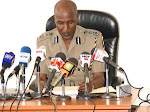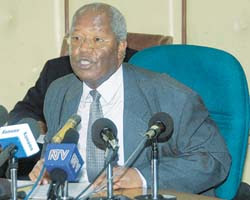 Bandit president Kibaki and traitor-in-chief Kalonzo Musyoka together control a willing two provinces. Six provinces in Kenya do not recognise the bandit government, are not willing to accept to be ruled by bandits and are running their affairs in a 'state within a state manner'. Today, Sunday 17 Feb 2008, Kosovo has declared independence from Serbia. Kosovo, a former province of Serbia covers an area of 10,887 sq. km, roughly the size of Connecticut and one third the size of Belgium (30,528 sq. km). Kenya's Rift Valley Province covers 173,854 sq. km, a whooping 16 times the size of Kosovo.
Bandit president Kibaki and traitor-in-chief Kalonzo Musyoka together control a willing two provinces. Six provinces in Kenya do not recognise the bandit government, are not willing to accept to be ruled by bandits and are running their affairs in a 'state within a state manner'. Today, Sunday 17 Feb 2008, Kosovo has declared independence from Serbia. Kosovo, a former province of Serbia covers an area of 10,887 sq. km, roughly the size of Connecticut and one third the size of Belgium (30,528 sq. km). Kenya's Rift Valley Province covers 173,854 sq. km, a whooping 16 times the size of Kosovo.
Kosovo has been run by the UN and NATO since 1999, when Slobodan Milosevic's forces were ousted after a NATO air war launched to end his crackdown on ethnic Albanian separatists. It has a population of 2m, mainly 90% ethnic Albanians. Muslims make up the majority, with Catholics and Christian Serbs. Is it time for Kenya to pull away from the imposed hegemony from Kirinyaga? Should Kenya declare independence from Nairobi and leave the thieving bandits to turn on themselves? Some analysts are saying nothing short of a devolved government will save Kenya. In the devolved system, which should borrow from the ODM manifesto, Nairobi will be retained as the nominal capital of a weakened central government. Wealth and administrative authority will be ceded to the periphery. People who have argued that Kenya (580,367 sq. km) is too small to devolve fail to appreciate the truth about such small but viable countries like Belgium. For starters, Belgium is about one-twentieth the size Kenya and yet its GDP seven times that of Kenya.
Is it time for Kenya to pull away from the imposed hegemony from Kirinyaga? Should Kenya declare independence from Nairobi and leave the thieving bandits to turn on themselves? Some analysts are saying nothing short of a devolved government will save Kenya. In the devolved system, which should borrow from the ODM manifesto, Nairobi will be retained as the nominal capital of a weakened central government. Wealth and administrative authority will be ceded to the periphery. People who have argued that Kenya (580,367 sq. km) is too small to devolve fail to appreciate the truth about such small but viable countries like Belgium. For starters, Belgium is about one-twentieth the size Kenya and yet its GDP seven times that of Kenya.
Do we have any semblance of government in Kenya? What is the definition of a state? Nation? What makes for the sovereignty of the state? Conventionally, you cannot rule over an unwilling population. Bandit president Kibaki is imposing his illegitimate will on an unwilling country.
By definition, A state is a political association with effective sovereignty over a geographic area. It may mean a nation state or a sub-national state. A state usually includes the set of institutions that claim the authority to make the rules that govern the exercise of coercive violence for the people of the society in that territory, though its status as a state often depends in part on being recognized by a number of other states as having internal and external sovereignty over it. The banditry of Mwai Kibaki has been rejected by the international community, which 75% of Kenya refuses to recognise it. What is the state of the state in Kenya?
A nation is a form of self-defined cultural and social community. Though a nation is not identical to a state, the people of a nation-state consider themselves a nation; while traditionally monocultural, it may also be multicultural in its self-definition. The term nation is often used as a synonym for ethnic group (sometimes "ethnos"), but although ethnicity is now one of the most important aspects of cultural or social identity, people with the same ethnic origin may live in different nation-states and be treated as members of separate nations for that reason.
Signs are that Kenya is a collapsed state. Look at the symptoms of failure and judge for yourself whether Kenya is gone to the dogs.
Indicators of a collapsed State
1. Reliance on private security for safety and security, without which one feels threatened;
2. Privatized food security, basic education, health and livelihoods, mainly through reliance on charity. The general population psyche is that the government has a minimal role, and is cynical of their basic priorities;
3. Systemic conflict, with no clarity on how it will be addressed, and the population accepting it as a norm;
4. Adulterated justice system which often appears "bought/hijacked" , hence trust in them is minimal;
5. Community level governance abused, hijacked, marginalized, or openly threatened;
6. In national institutions, checks and balances tempered with for example in: procurements, payments for goods and services, recruitments, promotions and deployments, and the targeting of support in survival safety nets (e.g. bursaries, health, justice for the poor among others);
7. Misuse and misallocation/ misapplication of national resources: Purchases of luxury goods at the expense of basic essentials (Cars, trucks, natural resources, other immovable assets);
8. Systematic and personalized threats meant to cow a person(s) perceived to be a threat from exercising their rights (it takes many forms);
9. Collapsed infrastructure and utilities, that do not get preventive maintenance, and when done, the very maintenance acts become revenue generation to individuals involved; hence the state of disrepair is desirable;
10. Competing parallel structures and systems, often between privatized services (owned by politically correct persons) and those that are official, and which are neglected or undermined;
11. Integrity of national institutions tempered with: Citizenship, taxation procedures application, allocation and targeting of support to populations in need;
12. Limited or no support to interventions on equity, promotion of livelihoods and growth;
13. Dramatic privatization of national assets, creating instantaneous millionaires, who then further acquire capacity to undermine the State;
14. Frequent high mortalities from preventable causes: accidents, natural calamities, and systemic violence, often instigated or catalyzed by those who should be protectors of the people;
15. Destruction of the natural environment, often with immediate negative consequences: river catchments, drainage systems, approval of constructions that undermine the environment, and misuse of water;















|